Lack of hydration is one of the main reasons your skin gets sallow, saggy, and dull-looking as you age.
But how do you rehydrate aging skin once it starts to sag and looking dull?
You can rehydrate aging skin through healthy habits such as a good diet, regular exercise, upgrading your skincare routine to your skin’s needs, and avoiding inflammatory foods and drinks.
Drinking a good amount of water (although beneficial) isn’t the only answer, and it is unlikely that it will make a big difference to how your skin looks.
Relying on your skincare routine or 8 glasses of water daily to make all the difference is likely to disappoint you because healthy and hydrated skin is the product of both lifestyle and skincare habits.
With that said, here are…
10 Ways To Rehydrate Aging Skin (Explained Below):
- Keep Your Environment Humid
- Consume Antioxidant-Rich Foods
- Avoid Caffeine And Alcohol
- Upgrade Your Skincare Routine
- Cleanse Once a Day
- Exfoliate Effectively
- Introduce Essences And Targeted Serums
- Start Using Lipid-Restoring Moisturizers
- Opt For Cream-Based Makeup Instead Of Powder
- Apply Sunscreen Every Single Day
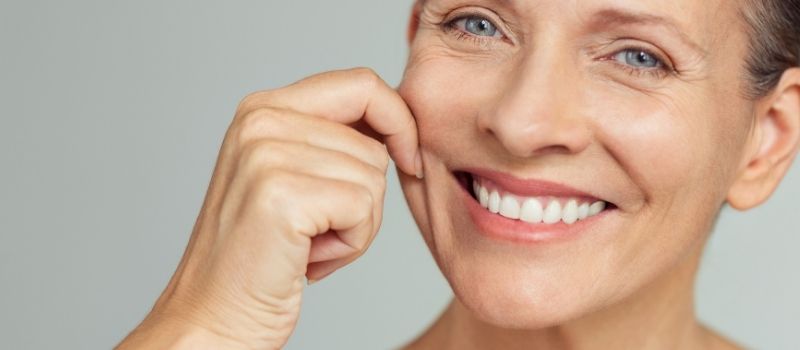
Keep Your Environment Humid
Hyaluronic acid is a molecule that is naturally found in the skin.
This molecule is an excellent humectant meaning it can draw moisture from the atmosphere and attract it into the skin.
Therefore, the skin replenishes itself better in humid weather by simply soaking in moisture from the air.
If you live in arid climates or places where it gets freezing during winter, chances are that you are dealing with dryness occasionally or constantly.
Therefore, make sure to have a humidifier (I love this one) or simply place a large water bowl anywhere near you.
The slow evaporation of water will incorporate into the atmosphere and your skin will not lose as much moisture as it normally would.
Consume Antioxidant-Rich Foods
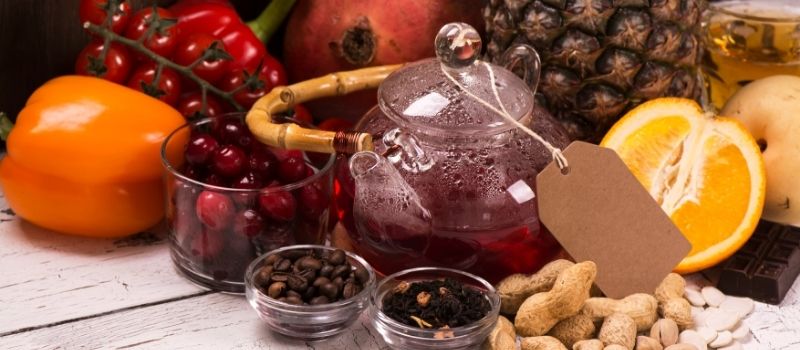
Science has demonstrated that the positive health effects attainable from an antioxidant-rich diet are more likely caused by stimulating the body’s natural defenses against aging.
Antioxidant-rich foods boost the production of the body’s enzymes that eliminate free radicals and prevent them from causing oxidative stress.
And since the skin receives nutrients and oxygen from the blood, it is very likely that it will benefit from an antioxidant-rich diet.
My favorite antioxidant-rich foods are broccoli, blueberries, nuts (walnuts in particular), avocado, sweet potatoes, sesame seeds, and oranges.
Avoid Caffeine And Alcohol
Caffeine and alcohol are two of the worst offenders for dehydrated and aging skin.
While one of them helps us get through the day and the other relaxes us in the evening, both are diuretics that compromise the skin’s health by depleting its water content.
Additionally, alcohol doubles down by hindering the production of the hormone vasopressin, which is essential for rehydration.
At the same time, caffeine triggers the release of adrenaline, a stress hormone that gives us a false sense of energy.
The general consensus is that one to two cups of coffee per day and a glass of alcohol in the evening is fine. Still, the best thing to do is avoid them when you can and perhaps try to replace them with healthier habits such as matcha or just water in the evenings.
Upgrade Your Skincare Routine
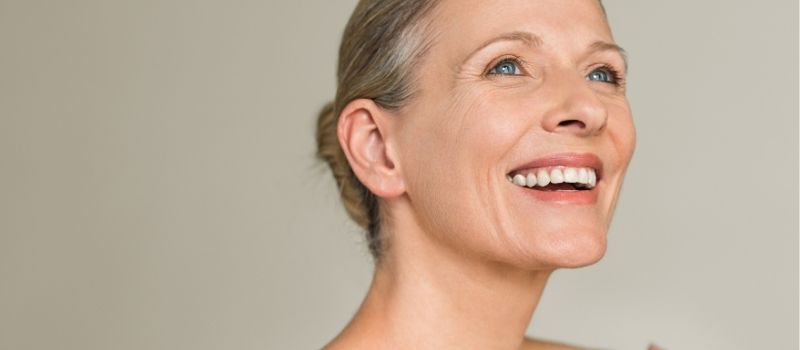
When your skin starts to show signs of aging, it means that your skincare routine, just as your general lifestyle needs a little upgrade here and there.
Perhaps changing your usual cleanser to something gentler and more hydrating will help, or adding that extra layer of hydration with a heavier serum or a moisturizer that’s a bit more occlusive.
The best way to do this is to go through your current skincare routine and see which products can potentially cause extra dryness based on their ingredient list.
If you dealt with acne in your 20s and 30s, chances are you’ve been using products that can be a little drying and dehydrating to accommodate your skin’s needs at the time.
However, these products are probably not suitable for you anymore if you are in your 40s and 50s even if you still deal with occasional breakouts.
If this is the case, slowly replace them with something more suitable for your particular skin’s needs.
Cleanse Once a Day
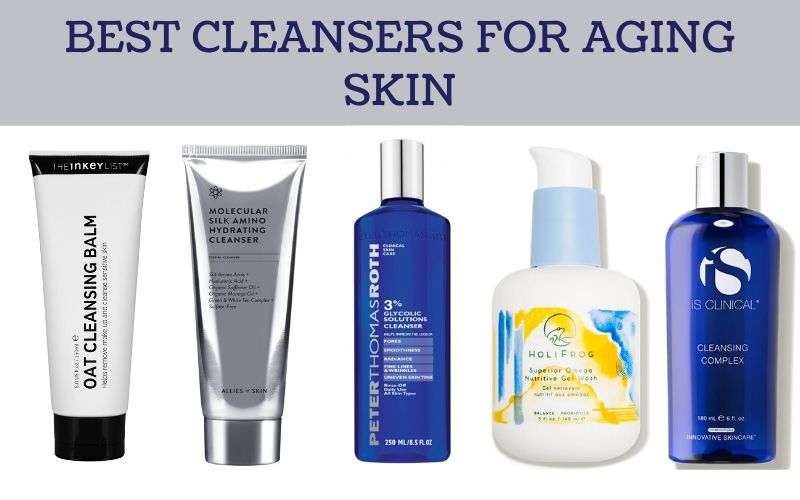
All cleansers contain surfactants intended to remove oil, makeup, pollution, dust, dirt, etc. from the surface of your skin.
However, these synthetic detergents or syndets although better than alkaline soap in the sense that they do not interfere with the microflora on your skin, can still alter a few things here and there and leave your skin in need of moisture.
As you age, the production of skin oil starts to slow down, you can definitely escape with cleansing your skin only once a day before going to bed.
It is important to go to bed with a clean face and not take whatever might’ve stuck onto the surface through the day on your pillow.
But chances are that you are not waking up with an oil-slicked face so using a cleanser in the morning is unnecessary and you may very well go about your day by washing your face with plain water.
RELATED: Check out my article on 10 Best Cleansers For Aging Skin
Exfoliate Effectively Without Dehydrating Your Skin
Exfoliation is a step that happens regularly in a good skincare routine. It is intended to remove the dead skin cells from the skin’s surface to reveal a brighter complexion from underneath.
But exfoliation can have a dark side, especially if applied recklessly.
As your skin ages, your cellular turnover slows down. This means:
The young skin cells are coming to the surface slower than they were when you were in your 20s.
This causes the mature or dead skin cells on the surface of the skin to make your complexion look dull and sallow because they’ve stayed there exposed to oxygenation for a longer time.
So the only logical solution is to over-exfoliate them to death and maintain a glowing complexion, right? Wrong!
The mature skin cells on the skin’s surface are part of the natural moisturizing factors and are well adjusted to retain more moisture into the skin, so removing them will expose your skin to rapid moisture loss and even more dehydration.
This is why you need to avoid harsh scrubs that contain nut kernels or excessive use of exfoliating acids as some of these are marketed as safe to be used even twice a day which is mindblowing to me. Absolutely do not do this!
Opting for gentle exfoliating acids such as lactic acid, mandelic acid, and exfoliating enzymes and using these no more than 2-3 times a week is the right way to exfoliate, get amazing results, and maintain healthy and happy skin.
RELATED: How To Exfoliate Your Skin

Introduce Essences And Targeted Serums
Introducing an extra layer or two of hydration through adding essences or targeted serums into your skincare routine is an extra step that can be super beneficial in your journey of rehydrating your skin.
Essences are a little bit thicker than toners and less thick than serums and most often contain beneficial hydrating ingredients such as hyaluronic acid, snail mucin, etc.
Serums, on the other hand, are particularly targeted treatments and some of them contain advanced hydrating and replenishing ingredients.
My personal favorites are the It’s Skin LI Effector that contains licorice extract to replenish and renew the skin and Paula’s Choice Omega Complex serum that contains omegas 3, 6, and 9 to strengthen the moisture barrier.
Additionally, I’ve used Medik8’s Hydr8 B5 Intense in the past, and although it’s a little up there with the price, it is one incredibly hydrating serum that should definitely be on your radar.
Start Using Lipid-Restoring Moisturizers
Lipids are the fats, oils, and waxes on the surface of your skin that serves as structural components of the skin and plays a significant role in maintaining the strength of your skin’s protective barrier.
Your skin’s protective barrier is what holds moisture into the skin and protects it from damage by keeping pathogenic organisms out.
Loss of lipids starts occurring as you age and this is one of the reasons your skin experiences exacerbated moisture loss with aging.
So it is important to restore the lipids and help your skin better retain moisture. Lipid-restoring moisturizers like the Triple Lipid Restore by Skin Ceuticals or La Roche Posay Cicaplast Baume B5 are two great options.
Opt For Cream-Based Makeup Instead Of Powder
Powder absorbs excess oil on the skin and it is a godsent option for people with oily skin.
However, aging skins leaning towards the dry and dehydrated side are more likely to benefit from cream-based makeup products instead of powder.
Its cons are that it requires a little bit of trial and error before you can master the blending techniques, however, there is no lack of cream-based products that you can use as these days you have a variety of options, including cream-based eyeshadows, blushes, foundations, eyebrow pomades, etc.
Apply Sunscreen Every Single Day
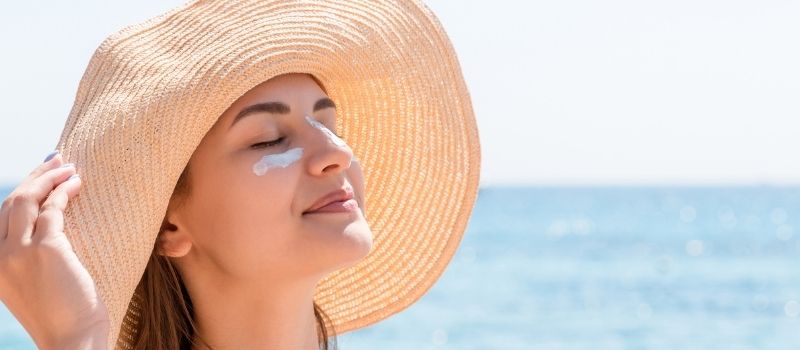
There are two types of sun rays that damage your skin in different ways.
UVA is the type of sun rays that can penetrate deeper into the skin and damage the production of collagen. This will, in turn, contribute to saggy skin and premature wrinkles.
Additionally, UVA rays increase free radicals in the cells, contributing to oxidative damage, dehydration, and irritation.
UVB is the second type of rays and these are strongest during summertime. UVB rays can induce apoptosis which is the programmed cell death of cells that become damaged by ultraviolet rays.
UVBs are also the rays with the ability to burn your skin, thus making it itchy, irritated, and dehydrated.
Wearing SPF daily, even on cloudy, rainy, and snowy days will protect your skin from dehydration and premature aging.

My name is Simone and I am a certified skin specialist. I created this website to teach my readers how to take great care of their skin and I also like to occasionally share my honest opinions on skincare products I’ve tried. You can learn more about me here.

Thank you, I truly enjoyed reading and gaining much needed knowledge from you article on Mature Skin. I am 76, icepick scars and recently discovered I am allergic to propylene glycol and Cobalt. My dermatologist suggested CeraVe cleanser and moisturizer, and I have not ventured beyond that. I tried Paula’s Choice Calm 1% BHA. I need mega moisture; a great serum and I have had zero luck finding a tinted sunscreen so I can eliminate foundation. I am going to take advantage of your suggestions in your article, but you did not suggest your favorite trusted sunscreen. Please DO! Thank you, sincerely, Sylvia Burns, TN